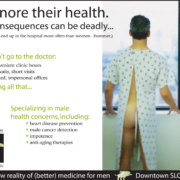Why Men Avoid The Doctor
Most men still ignore serious health risks until they start having problems.
Fact: Men die a lot younger than women of diseases that are highly preventable, namely, cardiovascular problems and cancers
Fact: Men tend to ignore their health in favor of professional obligations or family duties
Fact: Even young men have health risks that can affect their productivity & how well they age
Let’s face it. Most men with a life don’t associate going to the doctor’s office as time well spent. Having to make appointments months in advance, waiting (past your scheduled time) in a room with lots of patients, trying to ask questions when the doc seems rushed, being shuffled around the clinic with a clipboard from person to person and finally the doctor. “Another appointment because we’ve run out of time.” Men are right!…..i t’s inefficient and, for most of us, it doesn’t seem like a good value proposition.
And yet today more than ever, men need to be preemptive about cutting risks that could adversely affect their health ….. AND their ability to adapt to changing times. You definitely don’t want to end up in the hospital with days of down-time for a health problem that is preventable. How effective are you if you are always run down or sleeping badly? So check-ups are important and getting tests that can detect serious problems while they are still treatable seems like a ‘no-brainer.”
But chances are, more women are reading this “health” article than men. “Women are really the healthcare providers of the family,” says Salt Lake physician and researcher, Dr. Andy Peiffer. “They are often the ones making appointments for their husbands and they are also more likely to get regular check-ups and consult for symptoms that may signal health problems.
That’s because, for most men, especially in these challenging times, taking part of their workday to see the doctor seems frivolous, even risky. Yet a lot of men are aware, at some level, that they have health risks and that ignoring them can be a time-bomb. “Men are aware of the impact that ignoring simple healthy problems like high blood pressure or cholesterol can have,” says Dr. Peiffer. “Almost every man, starting in his 40’s, knows of another guy about their age who has faced a devastating diagnosis like cancer or heart disease. The fact that so many men ignore chronic health problems that are preventable is a disquieting reality.
A lot of businesses today are adapting to the changing expectations of their customers and they are coming up with new, innovative ways offer their services. The healthcare system needs to do the same. Some of these changes should focus on tailoring doctor’s visits to maximize the benefit to men. For physicians, it is important to realize that the most valuable resource that they can offer during the clinic visit is their time. Dr. Peiffer observes that, ”Most men, especially younger men, don’t need too much testing or thorough physicals every year. But they often have health concerns that they want to discuss, questions they want answered. These days, access to medical information, for instance, on the internet, means that people are very informed about risks and symptoms, and they want some time to discuss them. Often, the most important weapon we have for disease prevention or treatment is information.
“The trick is to get the most out of your doctor’s visit.” says Dr. Peiffer, “So, any guy, regardless of age, should make a plan before going in, just like you would for a work meeting. Prioritize your health concerns, tell the doc upfront about your expectations and issues or symptoms that concern you.” Save time and do this while you’re in for a complete physical if it’s been a while. Even risks that are a bit awkward to discuss like chronic stress, not enjoying life, lousy sleep, are really important health issues. “Not only do they affect your ability to be your best professionally, personally or as a father, these risks can develop into serious health problems that will really create down-time.” Remember, it is much easier to maintain health than to fix it once it breaks. If you get the sense that your doctor is not interested, not proactive, not advocating for your health, then change doctors. You wouldn’t go back to the same mechanic, the same restaurant, if the service was bad!
Dr. Peiffer is the medical director of the Men’s Health Center, established in Salt Lake City. His goal is to give men the best value possible for the time they spend with a doctor. “Our mission is to make a lasting beneficial impact for men who decide that their health is a priority. The Men’s Health Center clients are busy, like the rest of us, but they make optimal health one of their goals. They want to exploit the best that modern medicine has to offer and exert control over what is going with their health, the time they send with the doctor. “If a guy needs an hour to discuss something important, that’s fine, he’s got the hour. If he wants to ask a few questions on the phone or by e-mail, we’re good with that…it’s all part of effective time management…for the doctor and for our clients.” That is one reason why the Men’s Health Center also offers early morning appointments and weekend hours. Just as everyone of us is adapting to new realities, new challenges, so too must businesses, ESPECIALLY healthcare businesses. This kind of change is even more important for men’s health because men have a built-in avoidance mechanism for seeing doctors…a bit like their reluctance to ask for directions. Maybe that avoidance has something to do with the inefficiency and lack of satisfaction that men currently feel when they take time out of their workday to see doctors.
“The kind of empowerment we give our clients over their health risks leads to better outcomes and a sense of accomplishment for them and our doctors.” This country has the best medical resources in the world, we’re trendsetters, we just need to modify the system a bit, come up with fresh perspectives, so it works optimally. So no matter where a man seeks medical advice or treatment, if he has made the decision to invest some time for his health, then he should feel like he is part of the medical decision-making, that his doctor is his ally and helping him to reach his health goals. At that point, a man starts to make better choices, starts to “stick to the plan” and adds years to his life. Now that’s real health reform.

